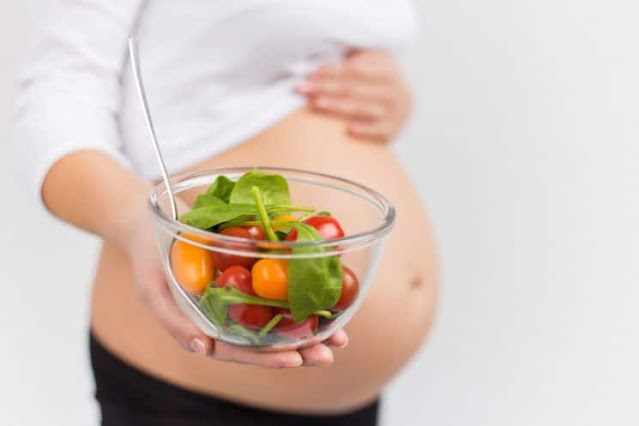Certain nutrients, such as iodine, protein, folic acid, and iron are required in greater quantities during pregnancy. It is also critical to consume enough calcium.
Making wise eating choices can contribute to a healthy pregnancy and infant. Here are some suggestions to help you eat healthy while pregnant.
Eat a healthy diet.
Eating healthy entails adhering to a healthy eating pattern that includes a variety of nutritional meals and beverages.
- Eat a wide range of whole grains, fruits, vegetables, low-fat dairy products, or foods that are fat-free and high in protein.
- Select foods and beverages with fewer added sugars, saturated fats, and sodium (salt).
- Refined grains and starches, which are found in meals such as cookies, white bread, and several snack items, should be avoided.
- If you're feeling under the weather, try eating some whole-grain bread or crackers.
Get the right amount of calories for you.
Being pregnant does not necessitate eating twice as much food.
- First trimester (first 12 weeks) - Most women do not require any extra calories during this time.
- Second trimester (13 to 26 weeks) - Most women require an additional 340 calories per day.
- Last trimester (beyond 26 weeks) - Most women need an additional 450 calories per day.
Inquire with your doctor or midwife about the number of calories you require during pregnancy.
Make nutritious snack selections.
Here are some examples of nutritious snacks:
- Yoghurt (low-fat or fat-free) with fruit (look for options with no added sugar)
- Crackers made from whole grains and topped with fat-free or low-fat cheese
- Hummus on carrots
Take a daily prenatal vitamin containing folic acid, iron and iodine.
- Folic acid aids in the prevention of some birth abnormalities of the brain and spine.
- Iron and iodine aid in the health of both you and your kid.
Consult your doctor or nurse about the best prenatal vitamin for you.
Eat 8 to 12 ounces of seafood each week.
Fish and shellfish include healthful fats that are beneficial to both you and your baby. Some fish, though, are heavy in mercury, a metal that might harm your baby's growth. Consuming seafood that is high in healthful fats but low in mercury is a good choice.
Best choices
Because these choices are lower in mercury, you can eat 8 to 12 ounces of it per week.
- Shrimp
- Canned light tuna
- Tilapia
- Trout
- Catfish
- Cod
- Salmon
- herring
- Shad
- Oysters
Good choices
If you don't eat other seafood that week, you can have 4 ounces of these fish.
- Grouper
- Canned or fresh albacore tuna
- snapper
- Halibut
- Yellowfin tuna
- Mahi-mahi
- Chilli sea bass or striped bass
Fish to avoid
Bigeye tuna, king mackerel, marlin, orange roughy, shark, swordfish and tilefish are all prohibited. They contain a lot of mercury.
Don't drink alcohol.
During pregnancy, no amount of alcohol is safe.
Don't eat certain foods.
These foods may contain bacteria that are harmful to your infant. Avoid the following:
- Sushi or raw oysters are examples of raw (uncooked) or rare (undercooked) fish or shellfish.
- Unless pasteurised, soft cheeses (such as feta, Brie, and goat cheese)
- Meats that are raw or rare, poultry, or eggs
- Juices that haven't been pasteurised or milk that hasn't been pasteurised
- Unless they are heated until boiling, lunch or deli meats, smoked seafood, and hot dogs are not recommended.
- Salads that have been prepared, such as ham salad, chicken salad, or seafood salad
- Alfalfa, clover, radish, and mung bean sprouts are examples of raw sprouts.
Limit drinks that contain caffeine and added sugars.
- If you're going to consume coffee or tea, go for decaf. Choose selections that aren't sweetened and don't add sugar.
- Instead of sugary drinks like soda, fruit drinks, and energy or sports drinks, drink water or seltzer.


Comments
Post a Comment